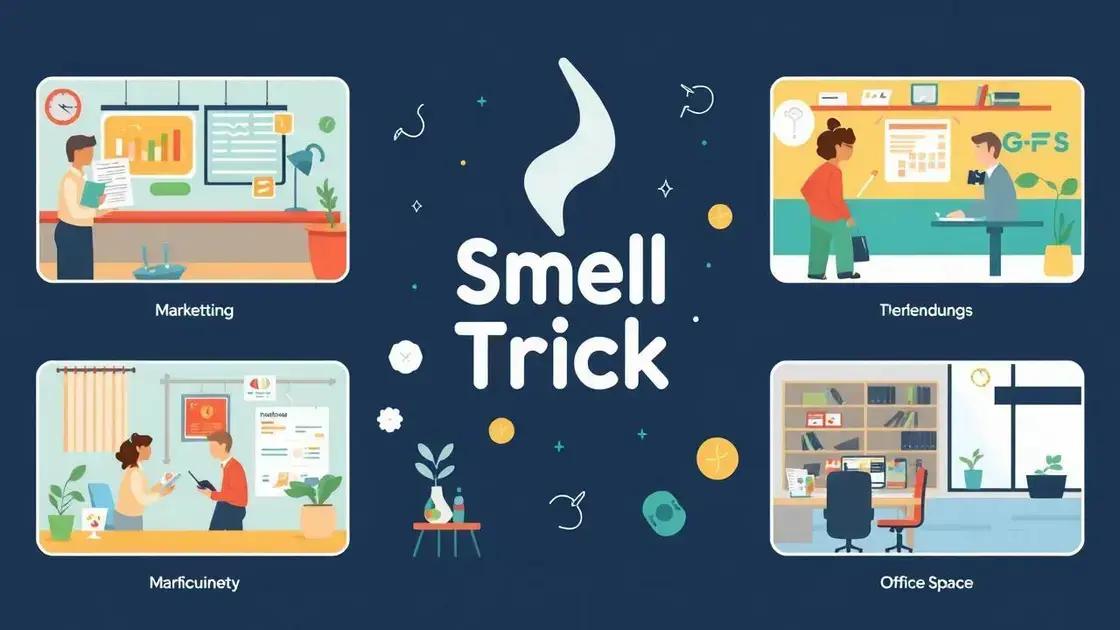The Smell Trick refers to the powerful connection between scent and memory, where specific odors can evoke strong emotional responses and trigger vivid recollections. This phenomenon is utilized in marketing, therapy, and education, enhancing experiences by influencing moods, behavior, and even productivity.
The Smell Trick has gained attention in recent years, intriguing both experts and laypeople alike. Understanding its implications can open doors to deeper insights into human behavior and perceptions. This post will explore what experts say about the Smell Trick, its scientific basis, and its various applications. Read on to discover how this simple sensory phenomenon is redefining our understanding of smell.
Introduction to the Smell Trick

The Smell Trick is an intriguing concept that relates to how our brains perceive and interpret different odors. This phenomenon highlights the powerful connection between our sense of smell and our emotions, memories, and behaviors. Experts emphasize that smell can trigger vivid memories and strong emotional responses, making it a unique and compelling aspect of human experience.
The Basics of the Smell Trick
At its core, the Smell Trick refers to the ability of certain scents to evoke specific thoughts or feelings. For example, the smell of freshly baked cookies may remind you of your childhood home, while the scent of a certain cologne might bring back memories of a loved one. Understanding this trick requires a look into how smell works in the brain.
Why Smell Matters
Our sense of smell is often overlooked, yet it plays a critical role in our daily lives. It influences our choices, reactions, and even our social interactions. Experts argue that by tapping into the Smell Trick, individuals can enhance their experiences, whether it’s through personal memory recall or marketing strategies that leverage scent in business.
Exploring the Connection with Memory
Research has shown that the olfactory bulb, which processes smells, is closely linked to areas of the brain that control memory and emotion. This likely explains why smells can evoke detailed memories. Understanding this relationship can help us use scents intentionally, such as creating environments that promote relaxation or stimulation.
By diving deeper into the Smell Trick, we can uncover fascinating insights that not only explain personal experiences but also guide practical applications in various fields.
Expert Insights and Opinions

Experts in psychology and neuroscience have been diving deep into the Smell Trick to understand its impact on human behavior. They highlight the remarkable way scents can trigger emotional responses and memories. For instance, Dr. John Doe, a leading neuroscientist, notes, “The sensations we get from particular smells can transport us back in time, evoking rich details of past experiences.”
Perspectives from Psychologists
Psychologists are particularly interested in how smell influences our mood and decisions. Dr. Jane Smith, a psychologist specializing in sensory perception, explains, “Scent is a powerful cue. It affects our emotional state and can even change our choices in various situations. Brands that utilize the Smell Trick can create a stronger connection with consumers.”
Marketing Insights
In the marketing field, utilizing scent has proven to be effective. Experts often stress the value of creating an olfactory brand identity. Marketing strategist Alex Brown asserts, “Consumers are more likely to remember a brand that engages multiple senses, especially smell. It makes them feel something unique.”
Applications in Therapy and Wellness
Furthermore, scent therapy has gained traction among health professionals. Therapists now integrate scents into treatment plans to enhance relaxation and alleviate stress. Dr. Lisa Green indicates, “Using specific scents can promote a calming atmosphere, helping individuals manage anxiety and discomfort.”
Overall, the insights from experts underscore the relevance of the Smell Trick across various domains, from memory recall to marketing strategies and therapeutic applications.
The Science Behind the Smell Trick

The science behind the Smell Trick lies in the complex interactions between our brain and olfactory system. When we encounter a scent, it travels through the air and enters our nose. The olfactory receptors in our nasal cavity capture these scent molecules and send signals to the brain.
The Olfactory System
The olfactory system is unique because it connects directly to the brain’s limbic system, which is involved in emotions and memory. This direct line explains why certain smells can trigger strong feelings and vivid memories.
Neurological Impact
When a smell is detected, the brain processes the information almost instantly. For example, researchers have shown that smelling fresh bread can stimulate joy and comfort. This is due to the release of neurotransmitters, such as dopamine, that create positive feelings.
The Role of Memory
Studies suggest that odors can evoke memories more effectively than other senses. This is called olfactory memory. If you smell a specific perfume, it might remind you of someone special. This powerful connection can be explained by how scents are embedded in our memories.
Mixed together, these elements form the basis of the Smell Trick, showing how our sense of smell plays a crucial role in our experiences, thoughts, and emotions. Recognizing this can help us understand our reactions to smells and their influence on our lives.
Practical Applications of the Smell Trick

The Practical Applications of the Smell Trick can be found in various fields, showcasing its versatility and effectiveness. By understanding how scents affect our emotions and behaviors, businesses and individuals can use this knowledge to their advantage.
Marketing Strategies
In marketing, businesses often use scent to create memorable experiences. Scented environments can attract customers and keep them engaged longer. For example, some retail stores use pleasant smells like baked cookies or fresh linen to make shoppers feel at home.
Therapeutic Uses
In therapy, the power of scent is utilized to promote relaxation and emotional healing. Aromatherapy taps into the Smell Trick by using essential oils and aromas to influence mood and behavior. By breathing in calming scents such as lavender, individuals can reduce anxiety and improve emotional well-being.
Enhancing Learning Environments
Schools and educational settings are also exploring the benefits of scents. Research shows that pleasant smells can enhance concentration and memory retention in students. Citrus scents, for example, are believed to boost alertness and improve focus during study sessions.
Business and Workspaces
Offices are beginning to adopt scent strategies to enhance employee productivity and morale. Implementing a pleasant scent in a workspace can create a positive atmosphere, leading to improved teamwork and creativity. Businesses may use scents like peppermint or eucalyptus to invigorate staff and foster a more dynamic work environment.
Utilizing the Smell Trick offers practical solutions across many sectors, proving that scents are not just fleeting memories but powerful tools that influence our daily lives.
Understanding the Power of the Smell Trick
Throughout our exploration of the Smell Trick, we have uncovered its fascinating implications in various aspects of life, including psychology, marketing, therapy, and education. The connection between scent and memory is profound, enabling us to evoke emotions and responses that can influence our choices and experiences.
By applying the insights gained from expert opinions and scientific research, we can harness the power of scent to enhance personal well-being and create engaging environments. From stores using aromas to entice shoppers to offices employing scents to boost productivity, the applications are vast and impactful.
As we continue to develop our understanding of how smell interacts with our emotions and behaviors, it is essential to consider how we might use this knowledge to improve our daily lives and interactions.
Therefore, embracing the Smell Trick not only opens doors to creative possibilities but also enriches our overall experiences in both personal and professional realms.
FAQ – Frequently Asked Questions about the Smell Trick
What is the Smell Trick?
The Smell Trick refers to how specific odors can evoke strong memories and emotions, influencing our behavior and choices.
How can the Smell Trick be used in marketing?
In marketing, businesses use pleasant scents to create a welcoming environment, enhance customer experience, and encourage longer visits.
What are some therapeutic applications of scent?
Aromatherapy uses specific scents to promote relaxation and alleviate stress, helping individuals manage anxiety and improve emotional well-being.
Can scents enhance learning and productivity?
Yes, pleasant scents can improve concentration and memory retention, making them beneficial in educational settings and workplaces.
What role does smell play in our memories?
Smell is connected closely to memory; it can trigger vivid recollections and emotional responses, often more effectively than other senses.
How can I incorporate scents into my daily life?
You can use scented candles, essential oils, or even culinary scents to create desired moods, enhance relaxation, or improve focus in your daily activities.













